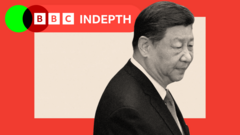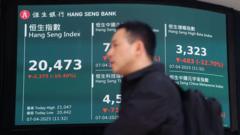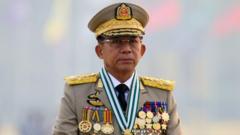The move comes after mass protests led to Hasina's flight to India and aims to hold the entire party accountable for crimes committed during her rule.
**Bangladesh Cracks Down on Awami League: A Shift in Political Power**

**Bangladesh Cracks Down on Awami League: A Shift in Political Power**
Bangladesh's interim government bans the Awami League party linked to the ousted leader Sheikh Hasina under anti-terrorism laws.
The interim government of Bangladesh has issued a significant decree, banning all activities of the Awami League, the political party associated with the ousted former Prime Minister Sheikh Hasina, citing anti-terrorism legislation. The announcement on Saturday marks a crucial development in Bangladesh's turbulent political landscape, following a large-scale student uprising that led to Hasina's departure from the country last summer.
Nobel laureate Muhammad Yunus, now head of the interim government, confirmed that the ban would remain in place until ongoing legal cases against the Awami League and its leaders are resolved. A recent amendment to Bangladeshi law enables broad legal action against a political party for crimes committed by its members, rather than focusing solely on individuals. This strategic shift aims to hold the Awami League responsible for its actions during Hasina's decade-long authoritarian rule.
Hasina's rule was characterized by heavy repression, culminating in protests that spilled onto the streets last year. After sustaining injuries during demonstrations, protesters, including those on crutches or in wheelchairs, rallied alongside other political factions this weekend, demanding the party's outright prohibition. Hasnat Abdullah, a pivotal figure in the protests, emphasized the urgency of the situation, urging supporters to maintain pressure until their demands were met.
The government's decision comes in the wake of disturbing accusations against the Awami League. A recent inquiry found evidence that under Hasina's leadership, mass disappearances occurred, and a United Nations report highlighted the deaths of over 1,400 people, including minors, due to brutal crackdowns on protesters. In reaction to the ban, the Awami League criticized the interim government as illegitimate, raising concerns about the nature of the political transition.
The upheaval began with student protests against a controversial job reservation system, which transformed into widespread demonstrations against Hasina's regime following the tragic death of a protester last July. As tensions escalated, Hasina's government resorted to severe measures: internet blackouts, curfews, and military deployments to suppress dissent.
On August 5, 2024, the pressure from the populist uprising forced Hasina to flee to India, paving the way for Yunus to assume power. Now, as Bangladesh navigates this precarious new chapter, the legal fate of the Awami League looms over the emerging political landscape, indicating a potential shift towards a more inclusive governance model.
Nobel laureate Muhammad Yunus, now head of the interim government, confirmed that the ban would remain in place until ongoing legal cases against the Awami League and its leaders are resolved. A recent amendment to Bangladeshi law enables broad legal action against a political party for crimes committed by its members, rather than focusing solely on individuals. This strategic shift aims to hold the Awami League responsible for its actions during Hasina's decade-long authoritarian rule.
Hasina's rule was characterized by heavy repression, culminating in protests that spilled onto the streets last year. After sustaining injuries during demonstrations, protesters, including those on crutches or in wheelchairs, rallied alongside other political factions this weekend, demanding the party's outright prohibition. Hasnat Abdullah, a pivotal figure in the protests, emphasized the urgency of the situation, urging supporters to maintain pressure until their demands were met.
The government's decision comes in the wake of disturbing accusations against the Awami League. A recent inquiry found evidence that under Hasina's leadership, mass disappearances occurred, and a United Nations report highlighted the deaths of over 1,400 people, including minors, due to brutal crackdowns on protesters. In reaction to the ban, the Awami League criticized the interim government as illegitimate, raising concerns about the nature of the political transition.
The upheaval began with student protests against a controversial job reservation system, which transformed into widespread demonstrations against Hasina's regime following the tragic death of a protester last July. As tensions escalated, Hasina's government resorted to severe measures: internet blackouts, curfews, and military deployments to suppress dissent.
On August 5, 2024, the pressure from the populist uprising forced Hasina to flee to India, paving the way for Yunus to assume power. Now, as Bangladesh navigates this precarious new chapter, the legal fate of the Awami League looms over the emerging political landscape, indicating a potential shift towards a more inclusive governance model.





















